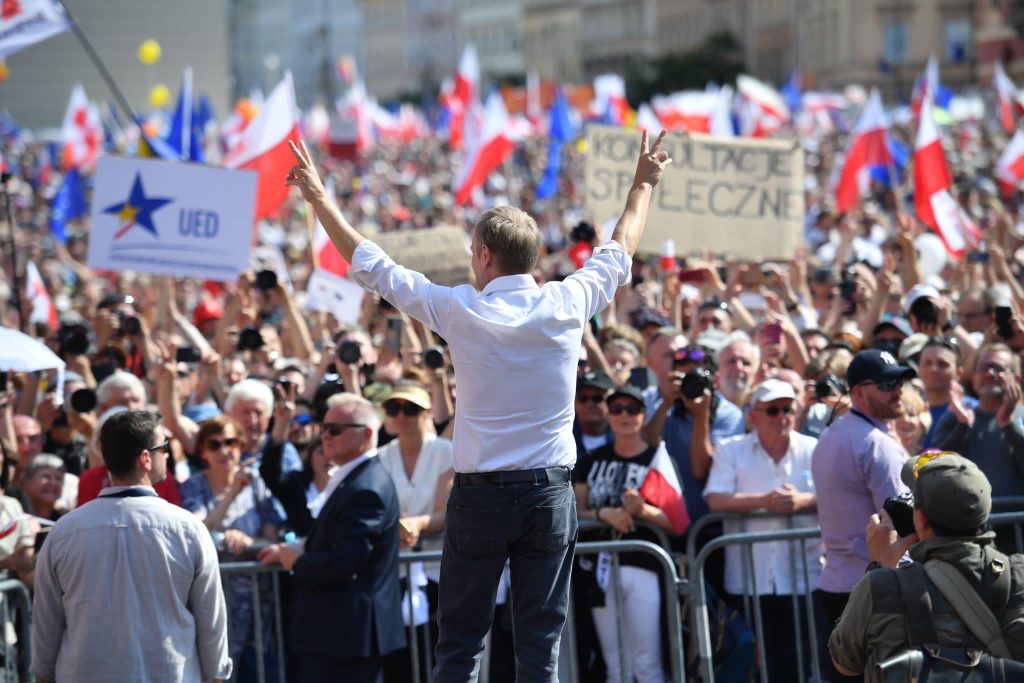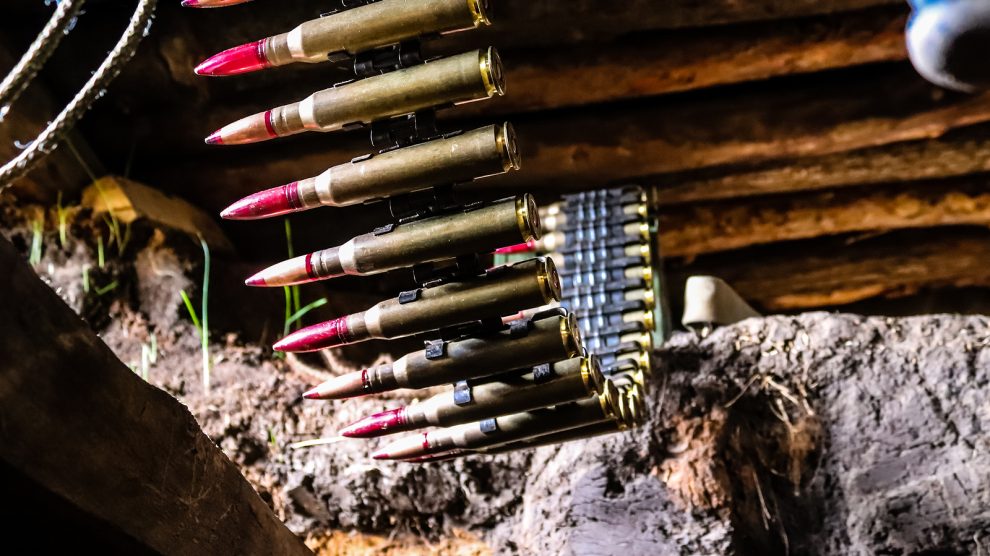Catch up quickly with the stories from Central and Eastern Europe that matter.
Russia’s war on Ukraine
Ukrainian forces have advanced on the Dnipro River onto the opposite bank of Kherson Oblast as they cross into Russian-occupied territory, Russian sources claimed on Thursday.
A prominent Russian milblogger ‘Rybar’ claimed Ukrainian troops pushed through Russian defences as they landed on the east bank of the Dnipro river.
He claimed they temporarily occupied the village of Poyma and positions on the northern outskirts of Pishchanivka.
According to the Institute for the Study of War (ISW), the milblogger later claimed that Russian forces pushed Ukrainian forces back from these positions towards the Dnipro River.
Russian troops this week launched their own major offensive on the town of Avdiivka in eastern Ukraine. Three battalions involving some 2,000 troops, dozens of armoured vehicles as well as jets have been reportedly involved in what is described as the largest-scale attack in the area.
The General Staff of Ukraine said that it had managed to repel dozens of attacks in Avdiivka and nearby areas.
Kyiv said on Tuesday that Ukrainian forces struck airfields in Russian-held territory in eastern and southern Ukraine.
The overnight strikes near the eastern city of Luhansk and the southern city of Berdiansk destroyed nine helicopters, knocking out an air defence missile launcher and damaging runways. It did not comment on media reports that Kyiv had used US-provided ATACMS long-range missiles for the first time in the attacks.
On Thursday, Kyiv said Russian forces had carried out new air strikes overnight on targets in eastern, southern and northern Ukraine. Ukrainian forces shot down three drones and one cruise missile.
Romanian prime minister Marcel Ciolacu and his Ukrainian counterpart, Denys Shmyhal, signed a solidarity lane agreement in Kyiv on Wednesday to ensure the secure transit of Ukrainian products and the development of border crossings between Ukraine and Romania.
“Together, we managed to find a way to facilitate both grain transit and to protect the interests of Romanian farmers,” Ciolacu said, adding that by the end of 2023, Romania will double the transit capacity for grain from Ukraine. The agreement comes after months of disputes between Ukraine and Central and Southeastern European members of the European Union over the flow of cheap Ukrainian grain into their markets.
The European Commission welcomed the signing of the Memorandum of Understanding, stating that the document “will further enhance the capacity of the solidarity lanes”, particularly in light of the damages inflicted on Ukraine’s transport infrastructure following Russia’s aggression.
Russian ships linked to military transport networks have collected cargo from North Korea and delivered it to an apparent Russian military port on multiple occasions over the past two months, according to new satellite images providing the clearest evidence yet that Pyongyang may be helping Moscow’s war effort in Ukraine.
The two ships had no record of running this route between North Korea and Russia until August, when high-level meetings between North Korean and Russian officials began, paving the way for Kim Jong Un to meet Vladimir Putin last month.
US intelligence assessments at the time suggested that Russia was looking to get North Korean weaponry to replenish its dwindling supplies for the war in Ukraine. White House officials said this now appears to be happening and named one Russian vessel, alleging that North Korea has transported as many as 1,000 containers with “equipment and munitions” from North Korea to Russia “in recent weeks.”

Donald Tusk campaigns ahead of Poland’s election. Photo: Donald Tusk official Facebook page.
Other news from the region
Opposition parties secured enough votes in Poland’s general election on Sunday to oust the ruling right-wing populist Law and Justice (PiS) party, results published on Tuesday confirmed. PiS won the vote with 35.38 per cent, ahead of Donald Tusk’s centrist opposition Civic Coalition with 30.7 per cent. However, with PiS well short of a majority, Tusk is now most likely to be able to form a broad coalition. Tusk could muster 248 seats in the 460-seat Sejm if he forms a government with the centre-right Third Way and New Left parties.
It was this week reported that US Secretary of State Anthony Blinken warned American lawmakers on October 3 that Azerbaijan could soon invade southern Armenia. Regarding Azerbaijan’s September military operation in Nagorno-Karabakh that resulted in almost all of the region’s 120,000 ethnic Armenians fleeing, Blinken reportedly said that the State Department was looking at avenues to hold Baku accountable and isn’t planning to renew a long-standing waiver that allows the US to provide military assistance to Baku.
At a Berlin Process meeting in Albania’s capital on Monday, EU leaders offered a new growth plan to the six Western Balkans countries that opens parts of the EU single market to them in return for deep reforms. This would open free movement of goods and services, road transport, energy, electricity, the EU’s Digital Single Market, and cashless payments within a single European payment area ahead of the full membership of Balkan states in the bloc.
Georgian President Salome Zourabichvili escaped impeachment on Wednesday, amid a bitter dispute with a government she says is pro-Russian and insufficiently committed to bids for EU and NATO membership. Georgian Dream, the ruling party, announced impeachment proceedings in September, accusing her of breaking the law by visiting EU leaders to drum up support for accession against the government’s will. Eighty-six out of 150 deputies in Georgia’s parliament voted for impeachment—well short of the required two-thirds.
Italy on Wednesday suspended the Schengen Treaty on freedom of cross-border movement and reinstated border controls with Slovenia, citing an increased threat of terrorist attacks after the October 7 massacre by Hamas in Israel. Schengen members Poland and Czechia have also recently introduced temporary border controls with Slovakia, citing the risk of illegal migration.
The leaders of Hungary, Serbia, Kazakhstan, Uzbekistan, and Turkmenistan attended the third Belt and Road Initiative Forum, in Beijing, to celebrate ten years of the massive Chinese-led development programme. Russian president Vladimir Putin shook hands with Hungarian Prime Minister Viktor Orbán at the summit—the first photographed handshake between the Russian president and an EU leader since Moscow launched its full-scale invasion of Ukraine in February 2022.
Estonia said on Thursday it would probe the damage on a Baltic Sea telecoms cable connecting the country to Sweden as part of its ongoing investigation about the rupture caused on another telecommunications cable, connecting Tallinn with Helsinki. On October 8, a gas pipeline and telecoms cable connecting Finland and Estonia were broken, in what Finnish investigators believe may have been deliberate sabotage. On Wednesday, Sweden said a third link had been damaged at roughly the same time as the other two.
Officials in Uzbekistan have said a government delegation will travel to Afghanistan to conduct negotiations over an ambitious 285-kilometre canal project that is sparking deep concern over water security in the region. This announcement comes on the heel of news that the Taliban-run government in Kabul is poised to start work on the second phase of the Qosh Tepa canal, which has been billed by Afghan officials as a way for Afghanistan to ensure its own farming needs by providing irrigation to 550,000 hectares of now-arid farmland.
Unlike many news and information platforms, Emerging Europe is free to read, and always will be. There is no paywall here. We are independent, not affiliated with nor representing any political party or business organisation. We want the very best for emerging Europe, nothing more, nothing less. Your support will help us continue to spread the word about this amazing region.
You can contribute here. Thank you.


